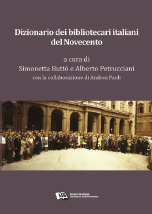BOOK REVIEWS, NOTES AND COMMENTS

DIZIONARIO
DEI BIBLIOTECARI ITALIANI DEL NOVECENTO
Simonetta Buttò, Alberto Petrucciani (Eds).
With the collaboration of Andrea Paoli
Roma: Associazione Italiana Biblioteche; 2022
882 p.
ISBN 978-88-7812-362-5
€ 60,00
[Dictionary of Italian librarians of the Twentieth Century]
The publication of a biographical dictionary dedicated to members of a profession is always to be hailed as good news, because it constitutes a valuable element for the reconstruction of the often complex and articulated history of that same profession, but above all it is good news if it concerns the profession of the librarian, perhaps little known but fundamental in the organization of knowledge and in supporting scientific research.
The origin of the Dizionario dei bibliotecari italiani del Novecento goes back more than two decades, when the volume Per una storia dei bibliotecari italiani del XX secolo: dizionario bio-bibliografico 1900-1990, edited by Giorgio De Gregori and Simonetta Buttò (Rome: AIB, 1999) came out, then in 2000 the online version was produced, which has been continuously enriched and updated (https://www.aib.it/aib/editoria/dbbi20/dbbi20.htm).
This new printed edition of the Dictionary presents 826 concise, accurate and reliable biographical profiles, the result of bibliographical and archival research, as well as an extensive bibliography, so that readers can continue with further reading if they are interested in a particular character. The set of biographies makes it possible to reconstruct the different aspects of the librarian’s profession in Italy, developments and critical issues, in a century of great political, social and technological changes.
What emerges is a varied and complex physiognomy of the Italian library system, in which librarians, known or little known, represent its connective tissue, regardless of the different types of libraries in which they work, e.g., national, public, religious, university or research libraries.
Here, it seems appropriate to point out, among others, the presence of biomedical librarians who, despite their small number, assume a significant role because of the complex disciplinary field in which they work, the highly specialized and technical documentary and bibliographic resources they manage, their very specific skills, and the type of users they serve (researchers, physicians, medical students, nurses, as well as patients).
The Dictionary includes profiles of a number of librarians at the Italian National Institute of Health (Istituto Superiore di Sanità, ISS) who have played a significant role in the development of the library and, more generally, in the growth of the profession: Elena Pinto Vecchi, who worked in the ISS Library from 1947 to 1973, later becoming its director from 1965; Maria Valenti, from 1951 to 1973, from 1965 as deputy director and head of the Information and Loans Section; and Vilma Alberani, from 1961, then head of the Editorial Activities Service.
Also present are Lamberto Bravi, who worked from 1915 at the library of the Bacteriological Laboratory of Health, directed by Bartolomeo Gosio, where he was, among other things, editor of the “Annuario bibliografico italiano delle scienze mediche ed affini” (1916-1926), and Nello Vian, responsible for the foundation of the library of the Faculty of Medicine of the Università Cattolica in Rome, which he directed from 1959 to 1975, as well as a number of librarians who worked at the State Medical Library (Elena Amico Moneti, Ada Caputi Moricca, Maria Teresa Danieli Polidori, Luciana Mancusi Crisari, Giuliana Persichelli Nibaldi, and Maria Schellembrid Buonanno).
Finally, it is striking that most of the librarians mentioned join the AIB, the Italian Library Association (Associazione Italiana Biblioteche), highlighting the fact that a profession, to be such, needs to find itself in a professional community with which to freely compare itself.
In conclusion, this Dictionary represents an important repertoire for the history of librarians and of those institutions of knowledge that are libraries, and while we remember – as the editors point out in the Introduction – “the women and men who have gone before us, we cannot escape the reflection that the value of libraries, for those who use them, depends first and foremost on the people who work in them”.
Vittorio Ponzani
Scientific Communication Unit
Istituto Superiore di Sanità, Rome, Italy
